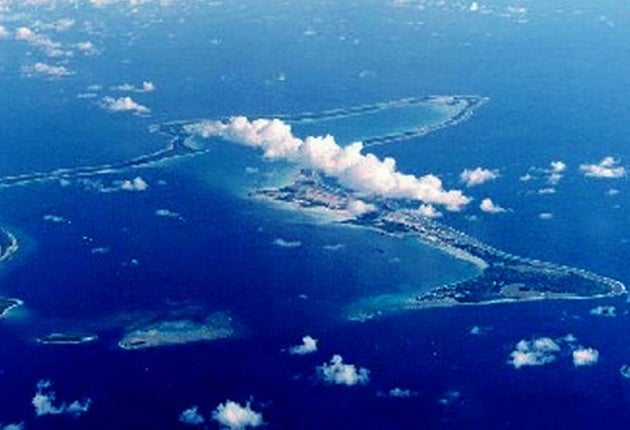Defeat for exiled Chagos islanders over controversial Indian Ocean marine park

A Government decision to create a controversial marine park in the Indian Ocean was upheld by the High Court today.
Former residents of the Chagos Islands who were forced into exile say the move, involving a ban on commercial fishing, was unlawfully aimed at preventing them resettling their former "paradise" homeland.
But today Lord Justice Richards and Mr Justice Mitting, sitting in London, ruled that the marine protected area (MPA) was "compatible with EU law".
The British expelled the Chagossians between 1965 and 1973 to allow the US to establish an air base on Diego Garcia, the largest island in the Chagos archipelago.
The expulsion has been described by critics as one of the most shameful episodes in modern British colonial history.
The exiled Chagossians have fought a long series of legal battles for the right of return.
Lord Justice Richards described the challenge to the MPA by the Chagos Refugees Group, led by Louis Bancoult, as "a further chapter in the history of litigation arising out of the removal and subsequent exclusion of the local population from the Chagos archipelago".
The MPA was created by top British diplomat Colin Roberts in his role as commissioner for the British Indian Ocean Territory (BIOT) on the instructions of the then Foreign Secretary in April 2010.
Chagossian lawyers said the moved followed British consultations with the US during which the Americans were assured the use of their base on Diego Garcia would not be adversely affected by the MPA.
Mr Roberts denied under cross-examination at the High Court that the marine park was created for the "improper purpose" of keeping the Chagossians out, as the US wanted, and said it was for environmental and conservation purposes.
Today the judges accepted his evidence. Lord Justice Richards said "a truly remarkable set of circumstances" would have to have existed for the case on improper purpose to be right, involving a long-term decision "somewhere deep in Government" to frustrate Chagossian ambitions by promoting the MPA.
"Those circumstances would provide an unconvincing plot for a novel. They cannot found a finding for the claimant on this issue," Lord Justice Richards ruled.
Lawyers for the islanders said a classified US government cable leaked by WikiLeaks supported their accusations.
They said Mr Roberts was reported in the cable telling US diplomats at the US embassy in London in May 2009 that the MPA would keep the Chagossians from resettling the islands and mean "no human footprints" or "Man Fridays" in the BIOT.
Nigel Pleming QC, appearing for the exiled islanders, asked Mr Roberts about the alleged "Man Fridays" comment and suggested to him that it was "a totemic phrase that offends".
Talking generally Mr Roberts said he "absolutely" agreed and would never have used the phrase in such circumstances, but he refused to answer specific questions about the authenticity and accuracy of the contents of the cable.
Initially the judges ruled that Mr Roberts should answer questions about the cable, and could not rely on a Government policy of "neither confirming nor denying" allegations involving matters of national interest.
But further submissions were put by Steven Kovats QC, on behalf of the Foreign Secretary.
The judges then ruled the Diplomatic Privileges Act 1964, which incorporates the 1961 Vienna Convention on Diplomatic Relations into domestic law, meant the alleged cable, or copies of it held by newspapers, were inadmissible in evidence.
Today the judges explained their decision, saying there was now "a settled principle of public international and municipal law that the inviolability of diplomatic communications requires that judicial authorities of states parties to the 1961 Convention should, in the absence of consent by the sending state, exclude illicitly obtained diplomatic documents and correspondence from judicial proceedings."
PA
Subscribe to Independent Premium to bookmark this article
Want to bookmark your favourite articles and stories to read or reference later? Start your Independent Premium subscription today.

Join our commenting forum
Join thought-provoking conversations, follow other Independent readers and see their replies